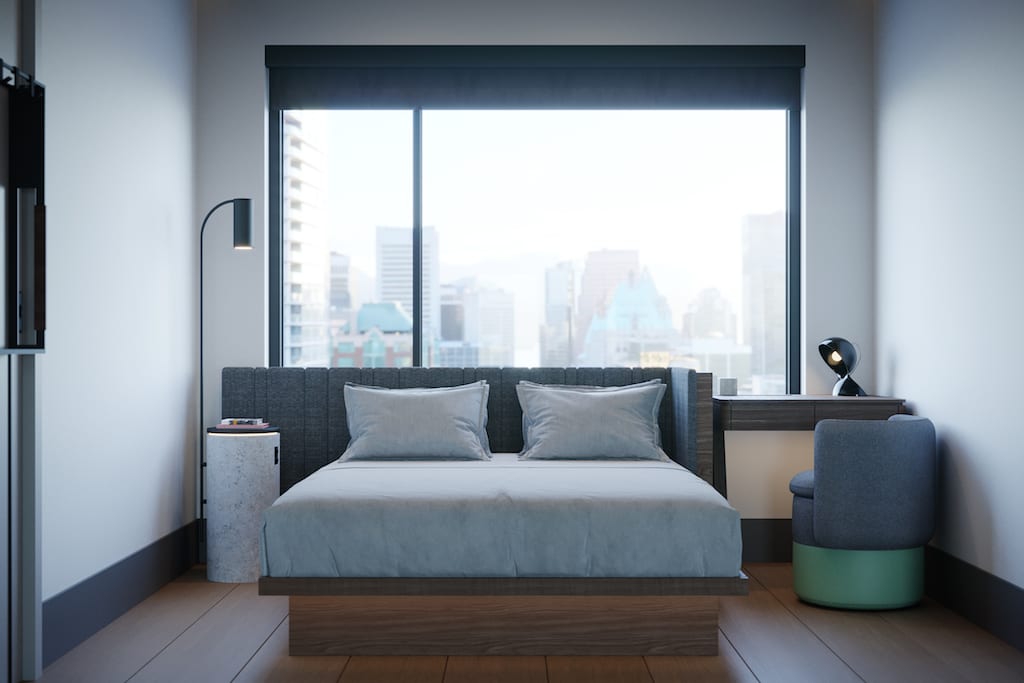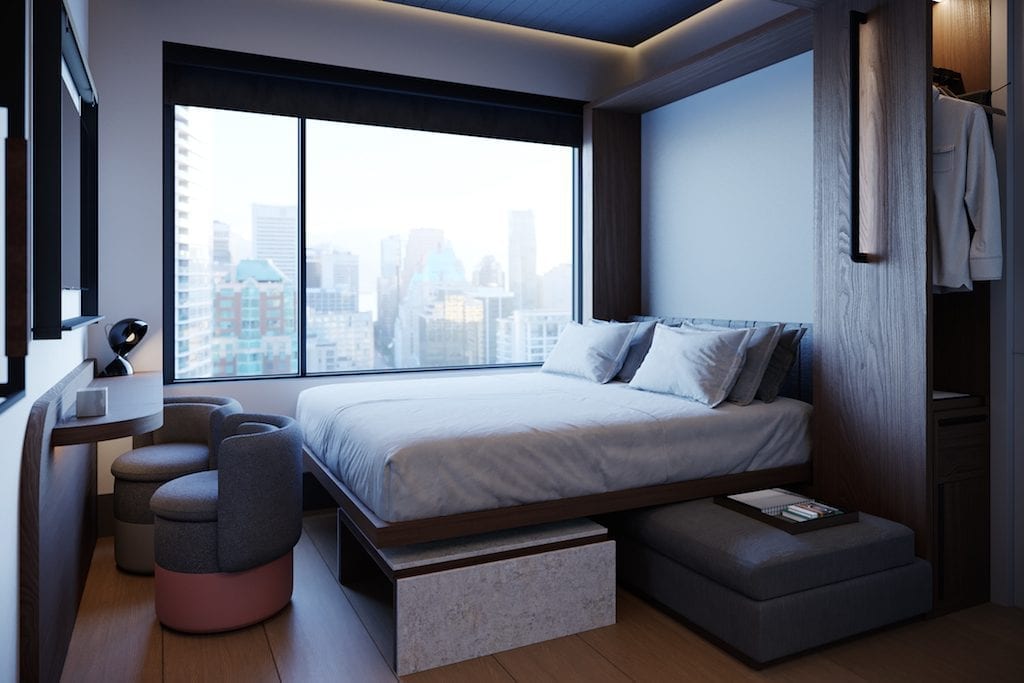Skift Take
So, it's not being marketed as a "hostel on steroids," as Hilton CEO Chris Nassetta once described it, but Motto by Hilton is more or less a lot of what we've seen before, albeit with a few twists.
Hilton’s newest brand, its 16th overall, following the addition of LXR, is an urban microhotel concept called Motto by Hilton.
And while it might not be marketed as a “hostel on steroids,” as Hilton CEO Chris Nassetta described it in September 2017 at Skift Global Forum, it certainly borrows a number of ideas from that category. And it is just one of many new microhotel, or pod-like hotel concepts to be introduced in the past few years.
“We’ve been developing the brand for a year plus, now and spending a lot of time in the hostel segment to understand what’s going on,” Tripp McLaughlin, global head of Motto by Hilton, said in announcing the brand unveiled Tuesday. McLaughlin said Motto was inspired by “the rise of boutique lifestyle hostels” and the fact that that hostels, traditionally, excel at “creating a community vibe” and work better for group travel.
“There is a nugget of truth to what Chris is speaking about,” he added, acknowledging Nassetta’s previous comments. “But with what hostels stand for, we just didn’t feel comfortable about planting our flag in there.”
McLaughlin isn’t alone in this assessment. Generator, a brand that made its mark as Generator Hostels, is also working to drop the “hostels” part of its name.
So, instead of calling it a hostel, Hilton has decided to market Motto as “the most affordable urban lifestyle brand” and an “urban microhotel” with rooms averaging 163 square feet each.
But just how affordable is Motto supposed to be — both for hotel owners and for potential guests?
McLaughlin said it would depend on the market and the individual property, but couldn’t disclose a cost to build per room key, or an average nightly rate. The average room count for a Motto is estimated to be 175 keys.
What he did note, however, was that this was a brand that would offer hotel owners “flexibility” to invest in the elements that matter most to them. As far as chain scales, or categories go, Motto would be “between midscale and upper midscale.”
In other words, Motto by Hilton be the epitome of “select service” when it comes to the services and amenities that owners want to select. Public areas like the lobby, which will feature a “premium coffeehouse” and a curated bar program, will be essential, but items like alarm clocks will likely disappear from guest rooms.
As for the name, “Motto,” McLaughlin said it came about “because we wanted a name with real world meaning. Motto is a guiding principle for a brand or person, and it’s very inclusive and speaks to a certain time or place, or area. Each Motto will have its own ‘motto’ overall.”

This rendering shows three of the different room types available in the new Motto by Hilton brand. Source: Hilton
The Demand for Tiny Hotel Rooms
Motto by Hilton is just the latest micro hotel brand and/or elevated hostel-like brand to debut in recent years. Predecessors include Marriott’s Moxy, Pod Hotels, Ian Schrager’s Public, Generator, AccorHotels’ Jo&Joe, and Sydell Group’s Freehand.
Demand for these types of hotel brands doesn’t seem to be slowing down anytime soon, either, and for groups like Hilton who see a potential “white space” for a concept like this, they are all the more attractive.
“In major cities where rates are high but there’s year-round leisure travel business, this less expensive but modern and chain-affiliated brand, with perks like loyalty program points, is being viewed as the new white space,” said Bjorn Hanson, clinical professor at the NYU Jonathan M. Tisch Center for Hospitality and Tourism. “A design and theme that appeals to Millennials is where the rapidly growing market is, and many hotel analysts see this as an entry level to brand loyalty, especially when direct booking is so important, and Hilton emphasizes that, perhaps, more than anybody.”
McLaughlin says that while Motto “will likely skew more Millennial, it’s not a brand solely for Millennials.” Instead, it’s for “connected and confident travelers who seek spontaneous moments and are willing to trade off some things in a room experience so they can experience more in location.”
Jay Patel, president and CEO of North Point Hospitality, and a Hilton hotels owner himself, said, “Until microhotels, there weren’t many lodging options available for travelers in the top global destinations, and certainly not affordable options because real estate is always at a premium in the neighborhoods where locals and travelers congregate.”
Not only will brands like Motto and its peers attract more budget-conscious travelers, but they will also appeal to cost-conscious owners and developers looking for brands to attach to newbuilds or adaptive reuse projects.
“To be a Hilton franchisee is a positive,” added Hanson. “The low construction and operating costs are also a plus. Put these together, and it’s just a matter of having enough market and consumer research to indicate there will be an acceptance level of a concept of design like this. I don’t think it will be difficult to attract.”
The appeal of these types of hotels, for groups, can also be seen as the traditional hotel industry’s answer to the sharing economy, or the popularity of private accommodation and vacation rental platforms like Airbnb and HomeAway — an area of accommodations that Nassetta has said he doesn’t see Hilton entering anytime soon, unlike his peers at AccorHotels and Marriott.
“This doesn’t compete directly with the sharing economy, but it provides a closer alternative to it than traditional hotel brands,” said Hanson.
Hilton’s McLaughin admitted, “We sometimes struggle, as a company, to develop product that meets those needs [of group travelers].” But with configurations that make it easy for groups of nine, for example, to travel together, thanks to connecting rooms, some of which even feature bunk beds, Motto offers a solution.
“I own 12 hotels (no hostels) and can only speak to what I see in my industry, but there is clear overlap in what hotel and hostel travelers are looking for,” Patel noted. Patel served on the Motto by Hilton band advisory group of hotel owners, and is also considering opening a Motto in Savannah, Georgia, in the near future.
“The findings of Hilton’s hostel research echoed much of what we, the Motto by Hilton brand advisory group, are hearing from our guests,” he added. “For example, hostel goers and hotel guests want to stay among peers they’re traveling with, and one of our most common requests is for adjoining rooms.”
Motto’s Main Features
At Motto by Hilton, there are four room types: a standard room, a corner room, a flexible room with a Murphy bed type set up, and a multi-bedded room with bunk beds.
Hilton is requiring Motto hotel owners to have at least 30 percent of their room inventory to be able to connect to one another, and the company is in the process of working with its guest reservations systems to make sure that guests can confirm connecting rooms at the time of booking.
Another item that Hilton is also working on in relation to Motto is the ability for guests to split payments between more than one person at the time of booking — a payments feature that companies like Airbnb currently offer. McLaughlin said Hilton is currently looking at a variety of different ways to offer split payments, and is considering either a partnership or building the capability internally.
Another mainstay feature of Motto will be the fact that all rooms will feature Hilton’s Internet of Things “Connected Room” concept, allowing guests to control the TV, lighting, temperature, streaming, etc., from their mobile devices if they are Hilton Honors members. At the moment, there are currently 500 rooms in North America that feature that technology.
One signature amenity to be offered by Motto is a “premium sleep experience,” McLaughlin said, noting that hotel owners will be encouraged to invest in the “beds, bed linens, blackout curtains, sound-dampening materials in walls, and any amenities that contribute to sleep.”
A quick glance at early renderings for the brand suggest a more muted color palette of blues and grays — unlike the Tru by Hilton original design concept — but whether the contemporary designs will make Motto stand out from its competitors, or easily accommodate the relatively small spaces they will inhabit, remains to be seen.
There’s no word yet as to when the very first Motto by Hilton will open, but one of the first is expected to open in 2020 in Marylebone, London, and Hilton said it also has deals for new Motto properties in Lima, Dublin, Savannah, San Diego, Boston, and Washington, D.C.
One thing in particular that Hilton wants to emphasize is that Motto is not like its successful midscale Tru by Hilton brand, which was launched in January 2016, and was an instant success, becoming Hilton’s fastest-growing brand in its history with more than 140 signed agreements in just the first year of its debut.
For one thing, McLaughlin, who also worked on the development of the Tru brand, noted, the lobbies for Tru are smaller and the room sizes are also different. The public spaces at Motto by Hilton are known as Motto Commons, and owners are encouraged to work with local partners and designers to develop them to feel more like extensions of the local neighborhood.
“There were some learnings we took from Tru, such as how to design efficiently, and work with consumers and owners from the beginning to get their buy in,” he said.
Given the success of brands like Tru and Hilton Garden Inn, Hanson said, “Hilton excels at the lower price point when it comes to brand launches.”
Hilton isn’t done dreaming up new brands, either. Up next for its newest brands will be a new luxury lifestyle brand, and possibly a “Hilton Plus” brand — not unlike what Starwood attempted to do with “Sheraton Grand.”
As for Patel, he’s looking forward to seeing how the Motto by Hilton brand progresses. “Hilton is excellent at creating brands that are set up for success because the company develops white spaces in the market. There is a strong business case for what Motto by Hilton will offer. I am excited for the autonomy Hilton is giving owners to make Motto by Hilton unique in our respective cities: staffing, amenities, and food-and-beverage programs.”
Have a confidential tip for Skift? Get in touch
Photo credit: A rendering of a Motto by Hilton guest room featuring a queen size bed. Hilton


